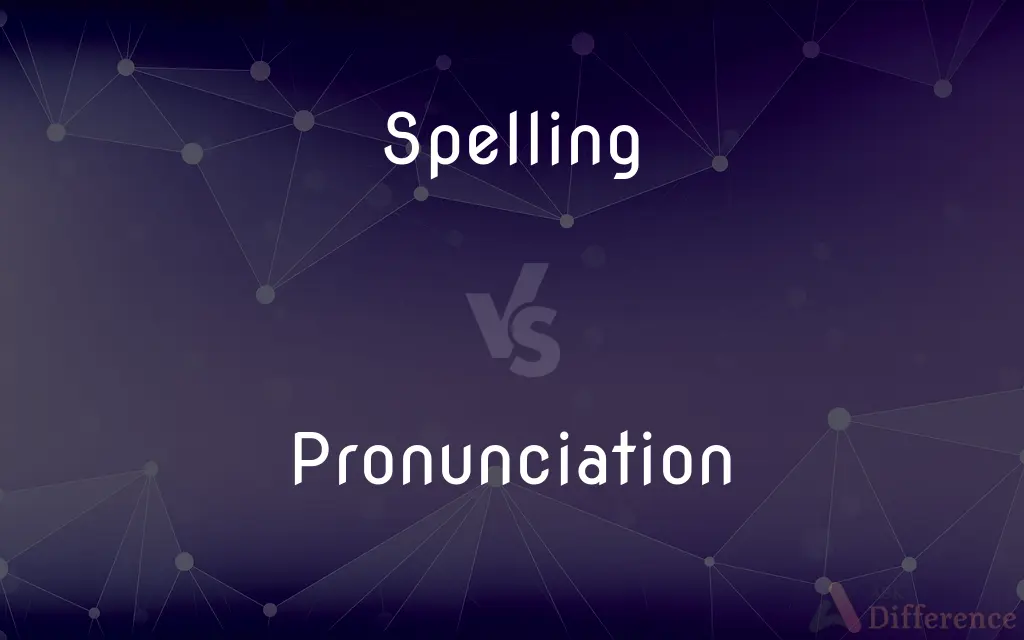Spelling vs. Pronunciation — What's the Difference?
By Fiza Rafique & Maham Liaqat — Updated on April 17, 2024
Spelling refers to the arrangement of letters in a word, governed by language-specific rules and orthography, while pronunciation deals with how those words are spoken or sounded out, influenced by accents and phonetics.

Difference Between Spelling and Pronunciation
Table of Contents
ADVERTISEMENT
Key Differences
Spelling is the method by which we arrange letters to form words according to specific rules and conventions of a language, essential for written communication, whereas pronunciation is the way in which a word is spoken, heavily influenced by regional dialects and individual speaker variations.
While spelling in English often remains fixed and follows standard rules with exceptions (like silent letters and irregular spellings), pronunciation can vary widely even among speakers of the same language due to regional accents, making phonetic interpretation more flexible.
Spelling is taught as a precise skill that requires memorization and understanding of orthographic patterns of a language, focusing on visual representation, whereas pronunciation requires auditory skills and practice to master the sounds and intonation patterns used in spoken language.
In English, the relationship between spelling and pronunciation can be particularly complex due to the language's vast borrowings from other languages and historical changes in speech that are not always reflected in spelling, leading to inconsistencies that can confuse learners.
Technology impacts both differently; spell-checkers and auto-correct features assist in maintaining correct spelling, while speech recognition software continues to advance in accommodating diverse pronunciations, highlighting the different challenges and considerations in learning and using language effectively.
ADVERTISEMENT
Comparison Chart
Aspect
Spelling
Pronunciation
Definition
Arrangement of letters to form words
The way in which a word is spoken
Influence
Language rules, orthography
Regional accents, phonetics
Stability
Generally fixed
Varies widely
Skill Required
Memorization, understanding of rules
Auditory perception, vocal practice
Technology Tools
Spell-checkers, auto-correct
Speech recognition, pronunciation aids
Compare with Definitions
Spelling
The ability to spell words correctly.
She won the spelling bee with her exceptional spelling skills.
Pronunciation
The way in which a word is pronounced.
Her pronunciation of schedule was distinctly British.
Spelling
A method of magical influence; a charm.
The witch cast a spelling to make herself invisible.
Pronunciation
A set of conventions for speaking a language.
Good pronunciation is essential for effective communication.
Spelling
A particular form of a word regarded in terms of its orthographic representation.
The British spelling of color is colour.
Pronunciation
The way a word or a language is customarily spoken;
The pronunciation of Chinese is difficult for foreigners
That is the correct pronunciation
Spelling
The act of stopping or resting for a period of time.
He took a short spelling from work.
Pronunciation
The act of making the sound of a word.
Pronunciation of foreign languages can be challenging.
Spelling
The process or activity of writing or naming the letters of a word.
His spelling has improved dramatically this semester.
Pronunciation
The manner in which someone utters a word.
His pronunciation is very clear, which makes him easy to understand.
Spelling
Spelling is a set of conventions that regulate the way of using graphemes (writing system) to represent a language in its written form. In other words, spelling is the rendering of speech sound (phoneme) into writing (grapheme).
Pronunciation
Pronunciation is the way in which a word or a language is spoken. This may refer to generally agreed-upon sequences of sounds used in speaking a given word or language in a specific dialect ("correct pronunciation") or simply the way a particular individual speaks a word or language.
Spelling
The forming of words with letters in an accepted order; orthography.
Pronunciation
The way in which a word is pronounced
Similar pronunciations are heard in Ulster
Spelling does not determine pronunciation
Spelling
The art or study of orthography.
Pronunciation
The act or manner of pronouncing words; utterance of speech.
Spelling
The way in which a word is spelled.
Pronunciation
A way of speaking a word, especially a way that is accepted or generally understood.
Spelling
A person's ability to spell words
A writer plagued by bad spelling.
Pronunciation
A graphic representation of the way a word is spoken, using phonetic symbols.
Spelling
Present participle of spell
Pronunciation
(countable) The formal or informal way in which a word is made to sound when spoken.
What is the pronunciation of "hiccough"?
Spelling
(uncountable) The act, practice, ability, or subject of forming words with letters, or of reading the letters of words; orthography.
Pronunciation
(uncountable) The way in which the words of a language are made to sound when speaking.
His Italian pronunciation is terrible.
Spelling
(uncountable) The manner of spelling of words; correct spelling.
Pronunciation
(countable) The act of pronouncing or uttering a vocable.
Spelling
(countable) A specific spelling of a word.
Pronunciation
The act of uttering with articulation; the act of giving the proper sound and accent; utterance; as, the pronunciation of syllables of words; distinct or indistinct pronunciation.
Spelling
A spelling test or spelling bee.
Pronunciation
The mode of uttering words or sentences.
Spelling
(music) A choice of notation among enharmonic equivalents for the same pitch.
Pronunciation
The art of manner of uttering a discourse publicly with propriety and gracefulness; - now called delivery.
Spelling
The act of one who spells; formation of words by letters; orthography.
Pronunciation
The manner in which someone utters a word;
They are always correcting my pronunciation
Spelling
Of or pertaining to spelling.
Spelling
Forming words with letters according to the principles underlying accepted usage
Common Curiosities
What are some tips for better pronunciation?
Listening to native speakers, practicing phonetics, and using language learning tools like pronunciation guides or apps.
Are spelling and pronunciation equally important in learning a new language?
Yes, both are crucial; correct spelling is essential for written communication, while accurate pronunciation is needed for spoken communication.
Why is there often a discrepancy between spelling and pronunciation in English?
Discrepancies arise due to historical spelling conventions and the influence of multiple languages on English, which affect spelling but not always pronunciation.
Does the pronunciation of a word ever change its spelling over time?
Yes, sometimes pronunciation changes can lead to changes in spelling, although this is less common in languages like English with fixed orthographies.
How does one learn correct pronunciation in a new language?
Through immersive learning, engaging with native speakers, and using educational resources focused on auditory and speech skills.
How can I improve my spelling?
Practice through reading and writing, using spell-check tools, and learning the common spelling rules and their exceptions.
What tools help with pronunciation?
Tools like pronunciation dictionaries, language learning apps, and online courses can be very helpful.
Can good spelling infer good pronunciation?
Not always, especially in English where many words do not phonetically match their spelling due to historical and linguistic reasons.
Are there any languages where spelling and pronunciation are closely aligned?
Yes, languages like Spanish and Finnish have more phonetic spellings where letters correspond closely to sounds, making them easier to pronounce from spelling.
Why do different regions have different pronunciations for the same spelling?
Regional dialects and linguistic heritage influence pronunciation, which can diverge significantly over time and distance despite consistent spelling.
How do children learn spelling and pronunciation differently?
Children learn spelling visually and through memorization, while pronunciation is learned auditorily and through repetitive practice.
Is pronunciation more flexible than spelling?
Yes, pronunciation can be more flexible due to regional variations and changes in spoken language over time.
Can mispronunciation affect communication?
Yes, significant mispronunciation can hinder understanding and clarity in communication.
What role do teachers play in teaching spelling and pronunciation?
Teachers provide foundational knowledge, correct errors, and guide students towards standard conventions in both spelling and pronunciation.
What is the impact of digital tools on spelling and pronunciation?
Digital tools like auto-correct and spell-check enhance spelling accuracy, while advanced speech recognition technologies are improving in recognizing and teaching pronunciation.
Share Your Discovery

Previous Comparison
Lady vs. Dame
Next Comparison
Knead vs. KneedAuthor Spotlight
Written by
Fiza RafiqueFiza Rafique is a skilled content writer at AskDifference.com, where she meticulously refines and enhances written pieces. Drawing from her vast editorial expertise, Fiza ensures clarity, accuracy, and precision in every article. Passionate about language, she continually seeks to elevate the quality of content for readers worldwide.
Co-written by
Maham Liaqat















































